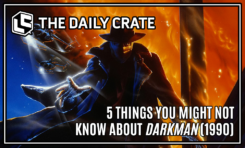This month we’re featuring both Breaking Bad and Better Call Saul across our LABORATORY theme in Loot Crate and Loot Crate DX – two of the best examples of an original show and its spin-off in perfect synchronicity.
As spin-off series go, Better Call Saul is certainly one of the most critically acclaimed of all time; you could probably say the same when you consider it amongst other prequels. In fact, there have been plenty of the most beloved series of all time – from Laverne & Shirley to Frasier – that were spin-off from something else. Heck, The Simpsons spun off from Tracey Ullman’s early Fox sketch show! Then there’s the point where the spinoffs accumulate into a full-blown franchise, such as Star Trek or even procedurals like Law & Order or CSI. Ups and downs, sure, and everyone has their favorite installment… (Love you so much, Deep Space Nine.)
Every spin-off seems like a hit on paper to somebody, but there are plenty of cases where television fails to keep the hype train rolling; for every Better Call Saul that soars, there are dozens of spin-offs that crash and burn, even the ones that had pretty good ideas at their core. We thought we’d take today’s Friday Five to single out a few spin-offs and franchise extensions that really had the best of intentions, but ultimately plain didn’t work… join us for a trip down short-lived memory lane!
Planet of the Apes (1974)
By the mid-1970s, one of the earliest bona-fide science fiction movie franchises had run its first course; the last of the original Apes flicks, Battle for the Planet of the Apes, was the least well-received and lowest-grossing to date. Well before the remakes and reboots kicked off in the 2000’s, though, Fox had the idea to reset their franchise in a different way: On the small screen. Planet of the Apes debuted on television one year later, landing on CBS (Fox wouldn’t have their own network ’til over a decade later); Apes merchandising in the form of toys and comic books was still going strong, so this should have worked. Sadly, even the presence of the estimable Roddy McDowell (playing a completely different chimpanzee than any of his film roles) couldn’t keep the series – featuring two protagonist astronauts this time, played by Ron Harper and James Naughton – from feeling, well, kinda samey. The central trio, on the run from the gorilla-led ape military, pretty much have the same adventure every week… or they did until CBS cancelled the show after 14 episodes.
K9 and Company
Look, we completely understand the urge to want to capitalize on the adorable; is there any question that BB-8 was a brilliant creation because they basically said “Let’s take R2-D2, only make him smaller… and cuter!“? Thus it’s unsurprising that the BBC thought it was a grand idea to take K9, the robotic dog companion who debuted during Fourth Doctor Tom Baker’s run of Doctor Who, and give him his own show. (In the process, they cast Elisabeth Sladen as the human co-star, elevating one of the most popular Who companions of all time to lead.) Unfortunately, while K9 was very popular with children who watched Who, with the older audiences he… wasn’t. Add to this the fact that the BBC switched programming controllers after the pilot aired as a Christmas special in 1981 (the incoming guy just didn’t like the concept of the show, at all), and K9 and Company died a swift and unceremonious death before it was ever really a full-fledged series. Amazingly the concept lived on decades later, as Sladen starred in her own youth-oriented Who spinoff The Sarah Jane Adventures on which K9 made several appearances.
The Lone Gunmen
Let’s get the hot-button issue out of the way right up front: The cliffhanger ending of this short-lived X-Files spin-off led directly to one of the most universally panned decisions in that show’s history, namely bringing beloved conspiracy nerds The Lone Gunmen back onto the mothership show only to kill them off. Sure, their untimely deaths were retconned later and they returned for the revival seasons, but the whole brouhaha ended up leaving a bad taste in the mouths of a lot of X-Philes – though probably not enough of them that were big enough fans of Langley, Byers and Frohike to keep their own spin-off going for longer than 13 episodes. It’s the most logical explanation for why The Lone Gunmen didn’t get at least one full season; the reviews were great, the inherent comedy of the trio’s personas survived intact, and the charismatic Zuleikha Robinson (late of Lost and Spartacus) was a terrific foil for them as mysterious thief Yves Adele Harlow. Damn shame, this one.
Stargate Universe
In 2009, SciFi Channel was on the precipice of the Syfy rebrand and clearly eager to go big with new shows and a bold approach to genre TV. Eventually, this rebrand would settle into a lean toward fun, lighthearted shows like Eureka and Warehouse 13; at first, however, Syfy seemed keen to step up the science fiction game with more mature themes and complex storytelling. As spinoffs go, two seasons isn’t a bad run at all but as part of the long-running Stargate franchise (itself a spinoff of a film!), Stargate Universe never really fulfilled its promise. While it aimed for more suspense and deeper storylines than SG-1 or Atlantis and featured an incredible cast that included Ming-Na Wen and Robert Carlyle, Universe never really figured out how to be “dark” without too-often just being mopey, or how to imbue this more serious tone with at least some of the sense of adventure that had kept the franchise going until then. (Stargate fandom still embraced the show enough to be super angry about its cancellation in 2011, though.)
Caprica
This is the one – the one I can’t forget, even if in some ways I really wish I could. Ron Moore’s Battlestar Galactica reboot is one of my all-time favorite shows, in any genre, a preference shared by many who loved BSG 2004 for the richness and intelligence of its world-building and serialized storytelling. When it ended in 2009 its network was at the very same juncture that launched Stargate Universe, part of the all-important Syfy rebranding. While a prequel to BSG – set in the Twelve Colonies prior to their destruction by the Cylons, just that part of the premise alone being rich with promise – wasn’t exactly “new”, it kept the legacy of one of SciFi/Syfy’s most lauded shows going. Then Caprica arrived… and it was just such a glorious mess. Part of the problem seemed to be that BSG show runners Moore and David Eick took a very interesting cyberpunk script concept by Remi Aubuchon – all about virtual reality, AI and potential moral complications of both – and used that as building block to tell a prequel in an existing franchise. The things that script had been trying to say were great, but shoehorning BSG‘s backstory into the mix left the resulting show feeling constructed, not organic. (Add to that some all-too-convenient retcons that involved nearly all of Admiral William Adama’s family from his boyhood; at one point, Adama grandpops Esai Morales is the one who literally hands over the tech required for inventor Eric Stoltz to perfect the Cylon prototype. Jeeeez.) In the end, both the source material and the targeted fandom were given short shrift with Caprica.



